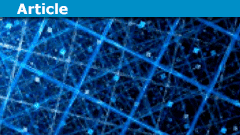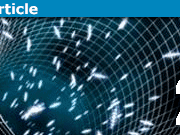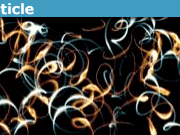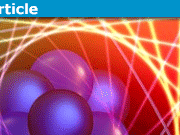9 Reasons Quantum Mechanics is Incomplete
Estimated Read Time: 2 minute(s)
Common Topics: qm, incomplete, therefore, quantum, incompleteness
I argue that all interpretations of quantum mechanics (QM) are incomplete, each for its own reason. I also point out that for some interpretations (those marked with (*)) this incompleteness is in fact a good thing because in principle this incompleteness may be resolved experimentally.
- Shut up and calculate logical positivism: It’s OK to talk about the meaning, it’s just not OK to talk about it when one is doing science. Therefore science is incomplete. Assuming that QM is a science, it follows that QM is incomplete.
- Old Copenhagen: There is a quantum micro-world and there is a classical macro world. Therefore QM is incomplete. (It is not specified where exactly the borderline between micro and macro is, so even QM and classical physics together are incomplete. (*) )
- QBism, relational, and other information-based interpretations: There is an objective reality out there, but QM has nothing to say about it. Therefore QM is incomplete.
- Statistical ensemble interpretation: Individual measurement outcomes exist, but QM has nothing to say about them. Therefore QM is incomplete.
- Von Neumann collapse: Consciousness causes collapse, but nobody knows what consciousness is. Therefore QM is incomplete.
- Objective collapse: One should add some additional terms to the Schrodinger equation, but there is no consensus on what these additional terms are. Therefore QM is incomplete. (*)
- Many worlds: To derive the Born rule one needs some additional axioms, but there is no consensus on what these axioms are. Therefore QM is incomplete.
- Consistent histories: All the allowed questions have unambiguous answers, but some questions are explicitly forbidden. Therefore QM is incomplete.
- Bohmian mechanics: Only fundamental objects have trajectories. For instance, a phonon (the quantum of sound) doesn’t have a trajectory. It is not known yet what the fundamental objects are, so QM is incomplete. (*)
(*) This kind of incompleteness is in fact good because different choices lead to different measurable predictions. In the Bohmian case see https://lanl.arxiv.org/abs/1811.11643
Read my next article on Anyons
Theoretical physicist from Croatia








Quantum theory seems defining the edge of the unscientific gap in the scientific worldview, and in that gap there's quite enough place for consciousness :smile:
Regarding “the incompleteness of QM interpretations”, there is, to my mind, a subtle hint given by David Bohm and Basil J. Hiley in “The Undivided Universe: An Ontological Interpretation of Quantum Theory”:
"Several physicists have already suggested that quantum mechanics and consciousness are closely related and that the understanding of the quantum formalism requires that ultimately we bring in consciousness in some role or other (e.g. Wigner [17], Everett [18] and Squires [19]). Throughout this book it has been our position that the quantum theory itself can be understood without bringing in consciousness and that as far as research in physics is concerned, at least in the present general period, this is probably the best approach. However, the intuition that consciousness and quantum theory are in some sense related seems to be a good one, and for this reason we feel that it is appropriate to include in this book a discussion of what this relationship might be." [emphasis added by LJ]
"There is an objective reality out there". I don't think that applies to the relational interpretation. And what about the "new" Copenhagen interpretation with decoherence taken into account?
@Demystifier just reading your paper on Bohmian Mechanics for Machinists.
Is there a tensor-network formulation of BM? Something that could support the equilibrium of Q(t), the tensor-like nature carrying the beable "pilot wave", something to support the kind of conservation law behind the continuity you invoke in first paragraphs of section 4.2?
As I understand it your paper is pointing out that BM says if we can just admit QM non-locality and assert some continuity we can have deterministic mechanics like we are accustomed. Awesome. Myself I don't have an issue with spatial non-locality but, and I haven't finished reading yet, it seems like GR is going to require the inclusion of temporal non-locality – more problematic? Not necessarily, it seems to me that is consistent with the difference you describe between Bohmian "particles" (the non-local Bohmian Beable network) and "perceptibles" i.e. the horizon of perception as seen from the…waiting room of "observer time".
What I don't get is how/why the observer perception got to be isolated, screened as it were, relative to the beable network. I mean if it's all one and the same universe and we are currently free to move about on Q(t) .
IOW why isn't it all more you know, Chronosynclastically Infundibulated? Why do we find ourselves traversing the surface of the Q(t) along the direction of the creeping arrow-of-time watching some aggravatingly probabilistic determinism rather than looking down at the big picture. How did we get put out?
points to Ads-CFT and shrugs?
The network formulation of the beable seems interesting because a) it can manage the continuity required, b) it can provide an iterated map model to explore just how local is local and non. i.e It's a model that could support/explain observations of self similarity that pretend to be indentical-ity. like phonons and superconductors and what not.
I use it colloquially.How do we measure the distance between physical theory and the ontology of nature, without having access to it? So, therefore, any physical theory will be incomplete?
/Patrick
It is not possible to verify the axiomatic completeness of any system as strong as arithmetic.Some examples of complete theories are: https://en.wikipedia.org/wiki/Complete_theory
/Patrick
SM is part of QM, measurement problem is an "interpretation" issue but mass and coupling is real/clear issue. I think understanding will come when the later is addressed first.The measurement problem is a problem in QM that interpretations try to solve, but it is a real issue as much as the masses and couplings. It might be the case that the explanation of couplings and masses is related to the measurement problem or it might not, from where we stand now they are two separate problems.
is it not possible to verify the completeness of any mathematical axiomatization of quantum mechanics?It is not possible to verify the axiomatic completeness of any system as strong as arithmetic. Note – this is verifying completeness in the Godel sense because we always have true statements that cant be proven in the system. But that has nothing to do with if a system is not complete because its axioms may contain a hidden circularity with regard to observations, which is what people that talk about QM completeness mean. You are falling for a common semantic error – because two different things use the same name you context shift. Such reasoning is invalid.
Thanks
Bill
I think this mixes up the incompleteness of the Standard Model (mass and coupling parameters) with the incompleteness of Quantum Theory in general (measurement problem, meaning of contextuality).In general that's true, but in my view of Bohmian mechanics those two types of incompleteness are closely related. See the paper linked in my signature.
Hi,
is it not possible to verify the completeness of any mathematical axiomatization of quantum mechanics?
An essay on the completion of the quantum theory
/Patrick
I think this mixes up the incompleteness of the Standard Model (mass and coupling parameters) with the incompleteness of Quantum Theory in general (measurement problem, meaning of contextuality).SM is part of QM, measurement problem is an "interpretation" issue but mass and coupling is real/clear issue. I think understanding will come when the later is addressed first.
QM is a physics theory and theories in physics must include predictions and since it does not predict everything( like mass and couplings), hence it is incomplete.I think this mixes up the incompleteness of the Standard Model (mass and coupling parameters) with the incompleteness of Quantum Theory in general (measurement problem, meaning of contextuality).
Quantum mechanics is not incomplete. It is a complete description of observation.QM is a physics theory and theories in physics must include predictions and since it does not predict everything( like mass and couplings), hence it is incomplete.
Quantum mechanics is not incomplete. It is a complete description of observation.It's a description of observations that occur in a classical world. But since everything is quantum how does a theory that assumes a classical world explain that world? That is the issue. A lot of progress has been made in resolving it, but it is not fully resolved yet. This means QM may or may not be complete – we just do not know yet.
Thanks
Bill
Quantum mechanics is not incomplete. It is a complete description of observation. Physics does nothing but describe observation. The laws of physics are the laws of observation.
Interpretations of quantum mechanics belong to philosophy, not to physics. It is philosophy that has failed so far, not physics. (I'm a philosopher, not a physicist, btw.)
In other words, "shut up and calculate" is good advice for physicsts. It's a preposterous advice for philosophers (but that's what logical positivism did, basically).
One doesn't have to be a professional philosopher to see the clear picture that quantum mechanics gives about the nature of reality. Einstein wasn't a philosopher, and yet he clearly saw the philosophical implications of quantum theory (in its Copenhagen version) and asked the candid question: "Do you really think the moon isn't there if you aren't looking at it?"
Einstein used this philosophical argument as an objection to the Copenhagen "interpretation" (which as you very well argued in "Against "interpretations"", should rather be called the Copenhagen theory): his contention was that the theory must be faulty. The theory, as far as I know, has been experimentally proven correct.
The philosophical conclusion is unavoidable: there is no physical world independent of observation. Quantum mechanics implies Idealism.
But again, this whole discussion lies on the realm of philosophy, not physics. (All alternative theories to Copenhagen can be understood as attempts to avoid Idealism, but as far as I'm aware they have failed so far.)
Yet one can imagine that most physicsts won't welcome the realization that physics is nothing but a specialised field of psychology: the study of observation (understanding observation as a special type of conscious experience that is bound by the laws of physics – the laws of observation).
This is a typical "the Emperor has no clothes" scenario, which I find rather amusing.
Some things that exist may not be quantifiable. We need to stop trying to force everything into the math number mold. Some things are abstract. They appear and disappear or change from one state to another. Some things cannot be detected with existing instruments, YET. Big discoveries yet to come.
Why your answer was so decisively "No" regarding connection to Godel completeness.For that matter, I highly recommend https://www.amazon.com/Gödels-Theorem-Torkel-Franzén/dp/1568812388
Isn't QM's (real) physical incompleteness both the observed symptom and the cause for the "No halting" problem. I mean Isn't the Halting Problem deeply connected to incompleteness? Wouldn't completeness imply the decidability of halting?QM incompleteness, if it exists, it is unsure now if it is or not although there is ongoing research, is nothing like Godel Incompleteness. Godel Incompleteness is really just Cantors Diagonal augment applied to logical systems:
https://www.physicsforums.com/threads/non-computable-functions-and-godels-theorem.953250/
Thanks
Bill
@Demystifier loved this article. It's philosophy tho.
Question-ish: I'm bashing my way through Hofstadter's Godel, Escher, Bach. It's hard. And if he's got the answer I haven't received it yet.
So I'm intrigued as I think others here are by the question of what "completeness" would even look like?
Isn't QM's (real) physical incompleteness both the observed symptom and the cause for the "no-stopping" problem. I mean Isn't no-stopping deeply connected to incompleteness? Wouldn't completeness imply stopping?
What has science to do with any ontologic completeness, anyway? You ask what reality is made of and you hear about strings and things that are abstract mathematical objects.
But by your criteria (2), the inability to clearly articulate a boundary between systems where classical is applied and where quantum is applied means that neither theory is complete.Neither theory is complete only if you claim that there is a strict border of that form. But if you say (which is more common in physics) that there is no strict border, but one theory is just an approximation of the other, then the other theory can be considered complete.
Quantum general relativity is intrinsically incomplete, even without deviations from detailed experimental data, because we can see that it is mathematically undefined at high energies. (I think Zee says something like this in his QFT text.).That is true. But some think the Standard Model is like that – its predictive power peters out at high energies thought to be about the Plank scale eg some think the standard model is trivial – personally I do not – but we really do not know – or at least from what I have read I think its still an open question.
Thanks
Bill
A point particle has infinite density. A blob of matter does not.Fair point. But many books use it.
Thanks
Bill
Then how do you handle a blob of matter? It is usually done by breaking it into a lot of infinitesimal size bits. But even aside from that if you want to exclude point particles a theory that requires that is not complete.A point particle has infinite density. A blob of matter does not.
Then how do you handle a blob of matter?
…some questions cant be asked…
That's one of them… . :DD
.
One can exclude point charges from the theory.Then how do you handle a blob of matter? It is usually done by breaking it into a lot of infinitesimal size bits. But even aside from that if you want to exclude point particles a theory that requires that is not complete.
Thanks
Bill
That is the conventional wisdom. But we have some curios things classically indicating classical physics is incomplete eg the a-causal runaway solutions of the Dirac-Lorentz equation:
https://arxiv.org/abs/gr-qc/9912045One can exclude point charges from the theory.
The distinction between classical electrodynamics and quantum mechanics is that the former is intrinsically complete (detailed experimental data is needed to show it is incomplete), while the latter is intrinsically incomplete (even without deviations from detailed experimental data, we know it is incomplete because measurement is considered to be a special process).That is the conventional wisdom. But we have some curios things classically indicating classical physics is incomplete eg the a-causal runaway solutions of the Dirac-Lorentz equation:
https://arxiv.org/abs/gr-qc/9912045
My view is that each layer of the onion has issues that can only be resolved by the next layer.
I am also expressing the view it is never ending – that may of course be wrong – there may be a final theory, but certainly we do not know it at present.
Thanks
Bill
Very nice article, well articulated and thought provoking. Thank you for writing this. After reflecting on the issues for a couple days, the question at the top of my mind is, Which physical theories are complete?
1. Classical mechanics?
2. Classical electrodynamics?
3. Classical thermodynamics?
4. Quantum statistical mechanics?
5. Classical (Newtonian) gravity?
My tendency is to consider classical mechanics as the shining example of excellence in a physical theory to which other scientific ideas should be compared. But by your criteria (2), the inability to clearly articulate a boundary between systems where classical is applied and where quantum is applied means that neither theory is complete. But if we are dogmatic about this criterion, are there any complete theories at all anywhere in science?The distinction between classical electrodynamics and quantum mechanics is that the former is intrinsically complete (detailed experimental data is needed to show it is incomplete), while the latter is intrinsically incomplete (even without deviations from detailed experimental data, we know it is incomplete because measurement is considered to be a special process).
Although the source of incompleteness is different, there is a similar distinction between classical electrodynamics and quantum general relativity. Quantum general relativity is intrinsically incomplete, even without deviations from detailed experimental data, because we can see that it is mathematically undefined at high energies. (I think Zee says something like this in his QFT text.)
Thus QM and quantum gravity provide open problems to theorists, even before they have been experimentally falsified. They are incomplete on almost purely "logical" grounds.
Because a photon in air or in glass is something different from a photon in vacuum (and similarly for an electron). Already their speed is different, and since all QED photons travel with the speed of light in vacuum, photons in a medium must have a different nature – they are quasiparticles only. Their nature changes each time they change the medium.Are there photons in a medium? I thought on entering the medium they become a quasi particle – a phonon if I recall correctly.
Thanks
Bill
Which physical theories are complete?That's pretty much Dirac's view – it's simply just a progression of what's gone before rather than the paradigm shifting idea of Kuhn and advocated by Heisenberg and others. Its my view as well for what its worth.
Thanks
Bill
I just want to mention Ensemble also has the same issue as Copenhagen – namely it assumes a classical world for the outcome to be an ensemble of.
Decoherent histories, while these days subsumed into Consistent Histories, tries to explain why some questions cant be asked – but it still has issues. Will those issues be resolved? Who knows.
Thanks
Bill
Very nice article, well articulated and thought provoking. Thank you for writing this. After reflecting on the issues for a couple days, the question at the top of my mind is, Which physical theories are complete?
1. Classical mechanics?
2. Classical electrodynamics?
3. Classical thermodynamics?
4. Quantum statistical mechanics?
5. Classical (Newtonian) gravity?
My tendency is to consider classical mechanics as the shining example of excellence in a physical theory to which other scientific ideas should be compared. But by your criteria (2), the inability to clearly articulate a boundary between systems where classical is applied and where quantum is applied means that neither theory is complete. But if we are dogmatic about this criterion, are there any complete theories at all anywhere in science?
Mmm, can you elaborate on that? Why wouldn't a photon I observe be fundamental?Because a photon in air or in glass is something different from a photon in vacuum (and similarly for an electron). Already their speed is different, and since all QED photons travel with the speed of light in vacuum, photons in a medium must have a different nature – they are quasiparticles only. Their nature changes each time they change the medium.
Electrons and photons in a medium (i.e., all electrons and photons we observe here on earth) are quasiparticles only. Do they have trajectories?Mmm, can you elaborate on that? Why wouldn't a photon I observe be fundamental?
What mean a QM interpretation?
A classical version of QM? A classical understanding of QM?
There need not be such thing.An ontology, like any physics theory has. Of course, an ontology doesn't need to be classical.
What mean a QM interpretation?Any explanation of QM beyond pure operationalism.
What means a QM interpretation?https://en.wikipedia.org/wiki/Interpretations_of_quantum_mechanics
What mean a QM interpretation?
A classical version of QM? A classical understanding of QM?
There need not be such thing.
''Bohmian mechanics: Only fundamental objects have trajectories.''
Electrons and photons in a medium (i.e., all electrons and photons we observe here on earth) are quasiparticles only. Do they have trajectories?Thanks for asking, they don't have trajectories in my view of BM (which somewhat differs from the standard view of BM).
''Bohmian mechanics: Only fundamental objects have trajectories.''
Electrons and photons in a medium (i.e., all electrons and photons we observe here on earth) are quasiparticles only. Do they have trajectories?
A possible variant of Old Copenhagen:
Everything can be described by quantum mechanics, but not everything at once, therefore QM is incomplete.This variant of old Copenhagen is quite in spirit of modern consistent histories.
Looks interesting, I have two rather naïve questions.
1) What do you mean by completeness? Is it a term you use colloquially, or with a precise technical meaning?I use it colloquially.
2) Can Gödel incompleteness have anything to do with it?No.
A possible variant of Old Copenhagen:
Everything can be described by quantum mechanics, but not everything at once, therefore QM is incomplete.
Looks interesting, I have two rather naïve questions.
1) What do you mean by completeness? Is it a term you use colloquially, or with a precise technical meaning? On wikipedia I see for example a definition a formal system is called complete with respect to a particular property if every formula having the property can be derived using that system. Which makes me wonder, is quantum mechanics (or its interpretations) a formal system?
2) Can Gödel incompleteness have anything to do with it?